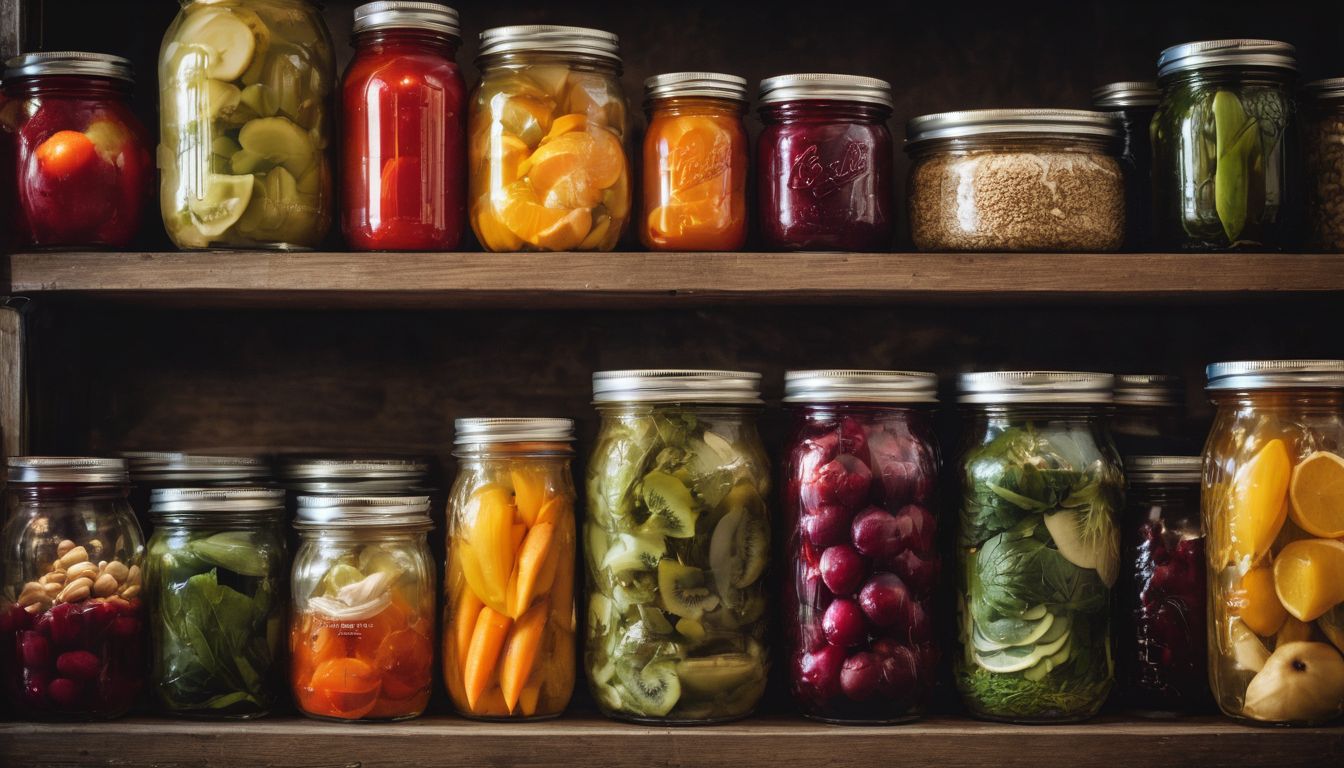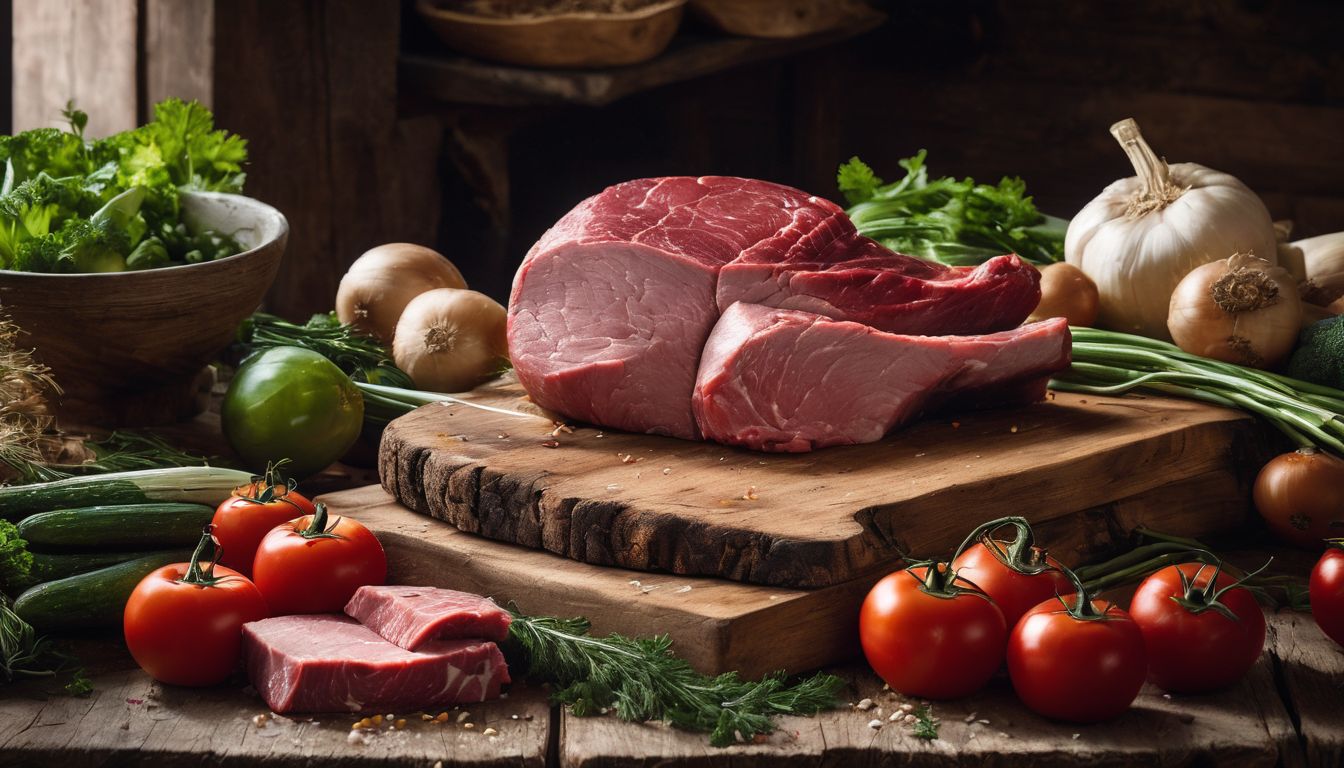Have you ever wondered what veggies are best to buy in March? In the UK, food travels an average of 1,500 miles from farm to plate. This guide will show you how eating with the seasons can cut that distance down and boost your health.
Keep reading for a fresh take on your diet!
Key Takeaways
- Seasonal eating aligns with natural harvest cycles, leading to fresher and more nutritious food choices. It supports local UK farmers and reduces the carbon footprint from transportation.
- A variety of fruits and vegetables come into season each month in the UK, offering a rich selection for consumers who wish to eat locally sourced produce all year round.
- Health benefits of seasonal eating include consuming foods richer in vitamins, minerals, and antioxidants at their peak ripeness. This practice can contribute to a cleaner diet free from pesticides often found in non-seasonal items.
- Environmental benefits are significant; choosing seasonal produce helps reduce greenhouse gas emissions tied to shipping out-of-season foods across long distances while promoting biodiversity.
- One can support seasonal eating by buying directly from local farmers’ markets, joining community-supported agriculture schemes or growing personal gardens contributing both to personal wellbeing and sustainability efforts.
What is Seasonal Eating?
Seasonal eating is the practice of consuming fruits and vegetables that are in season and locally grown. This approach to food not only supports local farmers but also ensures that produce is at its freshest and most nutritious.
Definition
Eating seasonally means choosing fruits and vegetables that are naturally growing at the current time of year. This practice aligns with the harvest cycles where foods reach their peak in flavour and nutrition.
When you eat food that is being harvested locally, you’re getting produce that hasn’t travelled long distances. This not only retains freshness but also significantly reduces environmental impact.
Choosing seasonal produce supports local farmers who cultivate crops suited to the UK’s climate. It connects consumers directly to the rhythm of nature, reinforcing a farm-to-table approach.
Local and seasonal eating often leads to enjoying a broader variety of foods throughout the year, each packed with optimum nutrients for that period – from winter root vegetables brimming with heartiness to summer berries bursting with juiciness.
Benefits
Now that we understand what seasonal eating is, let’s explore the benefits. Eating seasonally ensures that you consume nutrient-rich foods at their peak, providing you with essential vitamins and minerals.
By choosing locally sourced produce, you support local farmers and reduce the carbon footprint of your diet, contributing to a more sustainable food system. Additionally, seasonal eating allows for a diverse and ever-changing menu, encouraging creativity in the kitchen while promoting a deeper connection to nature’s cycles.
Supporting conservation efforts through environmentally friendly food choices can positively impact the planet by reducing energy consumption and supporting biodiversity. Choosing seasonal foods also means embracing traditional British cuisine and celebrating the unique flavors offered by each season’s harvest.
Eating Seasonally in the UK: A Month by Month Guide
Discover the best seasonal produce to enjoy in the UK throughout the year with our month by month guide. From hearty winter vegetables to fresh summer fruits, there’s something delicious for every season.
January
In January, British seasonal produce includes nutrient-rich vegetables like Brussels sprouts, kale, and cauliflower. Root vegetables such as parsnips and swedes are also in abundance during this month.
Seasonal fruits like apples and pears are readily available, providing a variety of options for creating delicious and healthy meals at home. Embracing these seasonal choices not only supports local farmers but also ensures that you’re consuming food that is at its peak freshness and nutritional value.
By choosing to eat seasonally in January, you can reduce your environmental impact by purchasing locally sourced produce.
Additionally, making the most of these seasonal offerings means you can enjoy the taste of fresh British produce while contributing to a more sustainable food system within the UK.
February
In February, root vegetables like carrots and turnips are abundant. UK-grown kale and leeks are also in season during this month. Look out for forced rhubarb which is a delightful addition to your seasonal eating repertoire.
Additionally, February marks the arrival of early-season sprouting broccoli, adding variety to your winter plate.
As March approaches, the days start to get longer and milder, bringing with it a new set of seasonal produce to enjoy.
March
In March, the UK sees an array of fresh produce hitting the shelves, including vibrant greens like spinach, kale, and watercress. Root vegetables such as carrots and parsnips are also at their prime during this month, making them perfect for hearty soups and stews.
Additionally, seasonal fruits like rhubarb bring a tart sweetness to desserts and baking. Embracing these seasonal offerings not only ensures that you’re enjoying the freshest flavours but also reduces food miles and supports local farmers.
As April approaches, the arrival of spring signals a new wave of seasonal eating in the UK.
April
April marks the arrival of a variety of delicious seasonal produce that you can enjoy in the UK. Look out for fresh asparagus, tender spring greens, and vibrant rhubarb. These nutrient-rich foods not only offer great taste but also provide essential vitamins and minerals to support your overall health.
Embracing April’s seasonal offerings means supporting local farmers and reducing environmental impact by choosing locally sourced produce over imported options.
As we move into May, let’s explore the rich array of seasonal fruits and vegetables that this month has to offer.
May
In May, the UK sees an abundance of seasonal fruits and vegetables. It’s the time for sweet strawberries, crunchy new potatoes, and tender asparagus. These delicious options not only taste better but also provide higher nutrient content when in season.
With local farmers’ markets bustling with fresh produce, May is the perfect time to explore and support local growers. Enjoying these seasonal offerings supports sustainable farming practices while reducing your carbon footprint.
Embrace the flavours of spring by incorporating these vibrant options into your meals.
June
In June, the UK sees an abundance of delicious and nutritious fruits and vegetables. You can enjoy juicy strawberries, cherries, and raspberries along with fresh peas, broad beans, and lettuce.
These seasonal foods not only taste better but are also packed with essential nutrients like vitamin C, fiber, and antioxidants. By choosing locally grown produce in June, you support sustainable farming practices that help reduce the environmental impact of food transportation.
As summer kicks off in June, make the most of the seasonal bounty by incorporating these nutrient-rich foods into your meals. Whether you’re enjoying a refreshing salad or blending up a tasty fruit smoothie, embracing seasonal eating in June is a great way to support local farmers while savoring the freshest flavors nature has to offer.
July
In July, the UK is bursting with an abundance of delicious fruits and vegetables. This month brings an array of vibrant produce including juicy strawberries, sweet raspberries, and succulent cherries.
In addition to this, you can also enjoy fresh peas, broad beans, courgettes, and crisp lettuce. Take advantage of these seasonal gems by incorporating them into your meals for a burst of flavour and nutrition.
Embrace the opportunity to indulge in these locally grown delights while supporting sustainable farming practices that benefit both your health and the environment.
August
Transitioning from the abundance of July, August brings a delightful array of seasonal produce in the UK. As summer continues, August is the perfect time to relish an assortment of fresh fruits and vegetables, including juicy berries, succulent tomatoes, sweetcorn, courgettes, and vibrant peppers.
Embrace the bountiful offerings of this month by incorporating these nutrient-rich foods into your meals for a fresh and sustainable dining experience.
In addition to indulging in these delicious seasonal treats, consider visiting local farmers’ markets or participating in community-supported agriculture (CSA) schemes to support local producers while enjoying the freshest produce.
September
Harvesting in September is plentiful, as the last of the summer produce is still available, and early autumn crops start to come in. This month marks the arrival of a variety of seasonal delights such as apples, pears, blackberries, carrots, and kale.
It’s an ideal time for environmentally conscious individuals to indulge in these locally sourced fruits and vegetables which are not only delicious but also packed with essential nutrients.
Transitioning into October brings even more vibrant produce from local farms. The autumn bounty offers a wide range of fresh options perfect for sustainable eating habits while supporting conservation efforts within our communities.
October
As the weather turns cooler in October, it’s time to embrace a new array of seasonal produce in the UK. This month, look out for hearty root vegetables like carrots and parsnips, as well as varieties of squash such as butternut and acorn squash.
Apples and pears are also at their best this time of year, offering a delicious range of options for both sweet and savoury dishes. Additionally, don’t miss out on nutrient-rich kale and Brussels sprouts that thrive during this season.
Embracing these locally available fruits and vegetables not only supports local farmers but also ensures you enjoy the freshest produce while reducing your carbon footprint.
November
November in the UK brings a bounty of seasonal delights, including root vegetables like carrots, parsnips, and turnips. The crisp air also welcomes hearty greens such as kale and Brussels sprouts.
Fruits are not to be missed either with apples and pears at their peak. This is an ideal time to explore warming stews and soups using these fresh ingredients for a comforting meal that nourishes both body and soul.
For those who are environmentally conscious, November is the perfect opportunity to support local farmers by purchasing these seasonal fruits and vegetables from nearby markets or joining a community-supported agriculture (CSA) scheme.
December
Transitioning from the colder days of November, December brings a new set of seasonal delights in the UK. It’s the time for hearty winter vegetables like Brussels sprouts, parsnips, and swede to shine.
Additionally, juicy clementines and pomegranates add a burst of freshness to winter dishes.
As the festive season approaches, embracing December’s seasonal produce not only supports local farmers but also offers an array of nutritious options. The availability of these fresh fruits and vegetables makes it easier to choose sustainable and environmentally friendly food options during this time.
Why is Seasonal Eating Important?
Eating seasonally is important because it promotes better health and nutrition by consuming foods at their peak freshness and ripeness. It also reduces the environmental impact of our food choices by supporting local farmers and reducing transportation emissions.
Health benefits
Seasonal eating offers a range of health benefits, including access to fresh, nutrient-rich produce. Consuming fruits and vegetables at their peak ripeness ensures an intake of vitamins, minerals, and antioxidants crucial for overall well-being.
Additionally, seasonal foods are often free from pesticides and preservatives commonly found in non-seasonal items, contributing to a cleaner diet.
Moreover, by supporting local farmers through seasonal eating, individuals can enjoy increased food safety and support sustainable agriculture practices. Prioritising seasonal options also promotes diverse diets that align with the body’s natural nutritional needs throughout the year.
Environmental benefits
While enjoying the health benefits of seasonal eating, it’s also crucial to consider the environmental advantages. By opting for locally sourced and seasonal produce, you reduce the carbon footprint caused by long transport distances associated with out-of-season foods.
Additionally, supporting local farmers promotes sustainable agricultural practices and helps preserve biodiversity in your area.
Choosing seasonal produce means fresher food that hasn’t been shipped across continents, reducing greenhouse gas emissions and contributing to a healthier planet. Moreover, it supports small-scale farming operations within your community, creating a more resilient and sustainable food system for generations to come.
Tips for Eating Seasonally in the UK
– Support local farmers by buying from farmers’ markets rather than supermarkets.
– Join a community-supported agriculture (CSA) scheme to receive fresh, seasonal produce directly from local farms.
Buy from local farmers’ markets
Supporting local farmers’ markets is a great way to access fresh, seasonal produce while reducing your carbon footprint. By purchasing directly from local farmers, you can enjoy the nutritional benefits of freshly harvested fruits and vegetables.
Additionally, buying from these markets supports the local economy and contributes to sustainable food practices in the UK.
Purchasing from local farmers’ markets also allows you to connect with the growers themselves, gaining insight into where your food comes from and how it’s produced. This direct relationship promotes transparency and trust in knowing that you are consuming quality, locally sourced produce.
Join a community-supported agriculture (CSA) scheme
Joining a community-supported agriculture (CSA) scheme connects you directly with local farmers, supporting sustainable farming practices and reducing food miles. By becoming a member, you receive freshly harvested produce at regular intervals, promoting seasonal eating and reducing your carbon footprint.
Engaging in a CSA scheme also allows you to establish a closer connection with where your food comes from, while helping to support the local economy and foster community resilience.
By participating in a CSA scheme, individuals can enjoy access to fresh, nutrient-rich foods that are grown without synthetic pesticides or fertilisers. Additionally, it provides an opportunity for people to learn about different types of fruits and vegetables that may not be commonly found in supermarkets.
Grow your own produce
Growing your own produce is a rewarding and sustainable way to enjoy fresh, seasonal food. It allows you to have full control over the cultivation process and ensures that you are consuming nutritious, pesticide-free fruits and vegetables.
Additionally, it reduces your carbon footprint by cutting down on transportation emissions associated with store-bought produce, contributing positively to the environment.
By cultivating your own fruits and vegetables, you actively participate in promoting biodiversity while being more self-sufficient. This means that you can enjoy a wider range of seasonal foods throughout the year without relying solely on commercially grown options.
Whether it’s a small herb garden on your windowsill or a backyard vegetable patch, growing your own produce creates opportunities for enjoying locally sourced food straight from your garden to your plate.
A Season by Season Rundown of Seasonal Eating in the UK
Embrace the changing seasons and learn how to make the most of seasonal produce throughout the year in the UK. Read on to discover a wealth of information about eating seasonally!
Spring
During spring, the UK bursts with an abundance of fresh, nutrient-rich produce. Locally grown asparagus, radishes, and tender salad greens start to appear on the shelves. Embrace this season by indulging in crisp new potatoes, vibrant rhubarb, and earthy spinach straight from local farms.
These seasonal offerings not only provide a burst of flavour but also pack a nutritional punch.
Additionally, spring is prime time for planting a variety of fruits and vegetables in your own garden or allotment. Whether it’s juicy strawberries or fragrant herbs like basil and mint, there are plenty of options to get your hands dirty and grow your own sustainable produce right at home.
Summer
Summer in the UK brings an abundance of delicious, nutrient-rich fruits and vegetables. From juicy strawberries and cherries to vibrant bell peppers and sweetcorn, there is a wide array of seasonal produce to enjoy during the warmer months.
By choosing locally sourced summer fruits and vegetables, you not only support local farmers but also reduce the environmental impact of transporting food long distances. Embracing seasonal eating in the summer means enjoying the freshest produce at its peak flavour while contributing to sustainable food practices.
As we move from summer into autumn, it’s essential to understand how different types of fruits and vegetables come into season throughout the year.
Autumn
Transitioning from the abundance of summer, autumn brings a shift in seasonal produce. This is when we see an array of nutritious vegetables and fruits making their appearance, such as pumpkins, squash, apples, pears, and root vegetables like carrots and parsnips.
These foods are not only delicious but also packed with essential vitamins and minerals. By embracing the autumnal harvest, you can relish the freshest and most flavourful local produce while supporting sustainable farming practices.
Opting for locally grown autumn fruits and vegetables reduces food miles which in turn minimises the carbon footprint associated with transportation. Moreover, choosing seasonal ingredients means engaging with nature’s own rhythm—honouring what grows each season rather than demanding out-of-season produce that relies on artificial enhancements or long-distance travel.
Winter
Transitioning from the abundance of autumn, winter brings its own array of seasonal delights. Root vegetables such as carrots, parsnips, and potatoes are in their prime during this season, making hearty stews and soups a comforting choice for those chilly nights.
Citrus fruits like oranges and clementines add a burst of freshness to winter meals and provide a much-needed dose of vitamin C to help ward off colds and flu. Embracing these nourishing winter foods not only supports local farmers but also reduces the carbon footprint associated with importing out-of-season produce.
The shorter days and colder weather make it even more satisfying to enjoy the warmth and comfort of seasonal dishes made from fresh British produce. Enjoying delicious dishes incorporating these wintertime offerings can inspire appreciation for the natural rhythms of each season while contributing to sustainable food choices that benefit both health and the environment.
Conclusion
In summary, seasonal eating in the UK offers numerous health benefits. It also supports local farmers and reduces environmental impact. Embracing seasonal food can help us live more sustainably.
By making informed choices, we can enjoy fresh, nutrient-rich produce all year round!
FAQs
1. What is seasonal eating in the UK?
Seasonal eating in the UK means enjoying fruits and vegetables at their peak taste and nutritional benefits by choosing local produce that’s harvested during its natural growing season.
2. Why should I eat seasonally?
Eating seasonally offers many advantages like fresher, nutrient-rich foods, plus it supports local farmers and reduces your environmental impact due to less transportation.
3. Can I find a guide for what foods are in season each month?
Absolutely! A monthly seasonal food guide is available which shows you what’s best to eat throughout the year, helping you pick the freshest farm-to-table options for your meals.
4. Are there any health benefits to seasonal eating?
Definitely! Seasonal foods often contain more nutrients because they’re harvested at their peak and don’t lose vitamins during long storage periods, making them good for your health.
5. Does eating locally help with food sustainability in the UK?
Yes, by choosing locally sourced food, you can help reduce food miles which contributes to sustainable eating practices within the UK and also ensures that you’re getting fresh produce.





